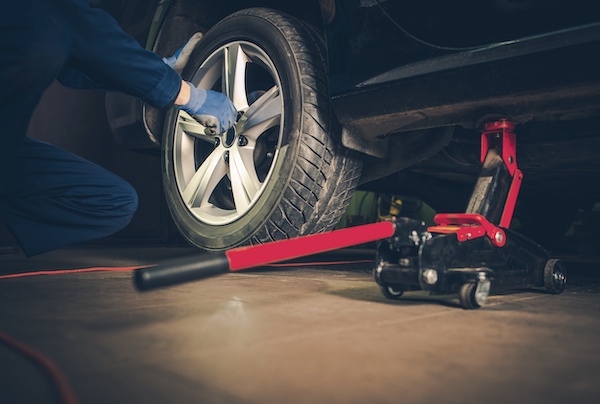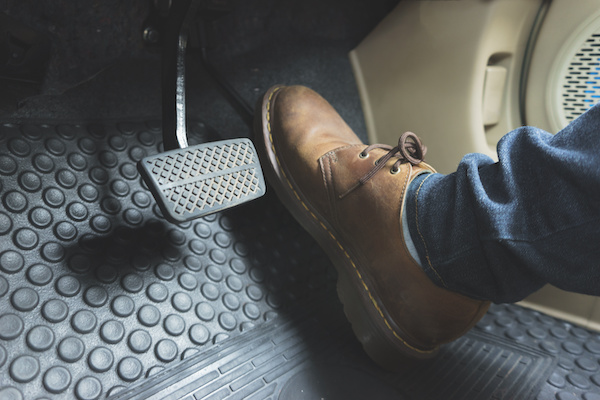Posted on 12/22/2021

Tires should be rotated every six months or every 6,000 to 8,000 miles, whichever comes first. But why, exactly? Is tire rotation really that important? Yes, in fact, it is! Why Tires Need to be Rotated When tires aren't rotated, they begin to wear down unevenly. This impacts the smoothness of the car's drive and overall handling. Additionally, uneven wear and tear shortens the lifespan of the tires themselves. Because the same areas are being worn down repeatedly and disproportionately, those areas become increasingly likely to experience issues which would ultimately require replacement. Regular tire rotation largely negates this issue of uneven wear and tear. Tires, of course, will wear with continued use; however, when this use is even and spread out, rather than limited to certain areas, the longevity of the tire is fully optimized. This optimization saves money in the long run, of course, but more importantly also promotes the safety of the driver by guarding against p ... read more
Posted on 11/29/2021
.jpeg)
Brake pads are a vital component of the vehicle's braking system, as they provide the friction that allows your car to stop smoothly and safely. All of your brake components work harmoniously from start to finish to slow or stop a vehicle in motion. Your brake pads make contact with the brake rotor and apply friction based on the pedal inputs from the driver. What Are Brake Pads Made Out Of? Today, drivers can choose from three types of brake pads: organic, semi-metallic (or metallic), and ceramic. Organic ($)- Organic brake pads are typically made of a mixture of rubber, carbon, glass, or other materials. These types of brake pads are suitable for everyday driving of non-performance vehicles and don't produce much heat. They are also the lowest price point, but they require more frequent changes. They also don't perform as well as the metallic and ceramic brake pads. Semi-Metallic/Metallic ($$)- Semi-metallic brake pads contain between 30-70% of me ... read more
Posted on 10/28/2021

There are way too many misconceptions that have plagued the automotive repair industry. And every day, they're constantly getting spread around. Today, we are going to be putting a stop to some popular myths about brakes. Myth #1: You need to warm up your brakes The brakes on modern cars today produce enough friction to stop your vehicle, even in extreme temperatures. It doesn't matter how hot or cold it is; if your brakes are healthy, they should efficiently stop your car. Myth #2: Wet brakes increase your stopping distance Indeed, it can take up to three times longer to stop on a wet surface over a dry one; however, it is not your brakes that cause the lag. Your stopping distance increases due to a decline of tire traction (not from wet brakes). That is why it is best to brake sooner than later in harsh weather conditions. Myth #3: There are specific laws regarding your brakes Surprisingly, your brakes are one of the few parts that have no laws or restrictions. It ... read more
Posted on 9/28/2021
.jpeg)
Smells emitted by any vehicle can give drivers an idea of the health of their vehicle. While some smells are more urgent than others, ignoring unusual vehicle smells can result in a vehicle breakdown. Whenever you catch a funky fragrance in your car, we highly recommend you bring your vehicle to Advanced Auto Car Care Center for an inspection by our professional team. Let's go over the list of unusual car smells and what they could mean for your car: The smell of hot oil usually signifies that you have an oil leak in the exhaust manifold. You can investigate by looking for oil under the vehicle after it's been parked. You may also see smoke under the hood. A burnt rubber smell might be typical at a drag race, but when it's eminent on your everyday commute, something is surely wrong. A burning rubber smell usually means one of your rubbery components is at fault, like a slipping drive belt or loose hoses rubbing against the drive belt. ... read more
Posted on 8/30/2021

Whether you're a parent who's taking your kids to school or you're a student driving yourself to class, the beginning of the back-to-school season can be intense. Operating a vehicle amid heavy traffic can be frightening for some, so it is vital to prepare yourself for the unexpected. From adjusting to a new schedule, packing your lunch, and figuring out your morning/afternoon routines, car problems should be the least of your worries. Here are the essential things we recommend bringing with you in your car to have on hand throughout the learning semester: Jumper Cables - Jumper cables are an essential item for all motorists. These yellow and red cables will come in handy if you find yourself with a drained battery. First Aid Kit - If you or your kids experience a minor injury, you'll be grateful to have a first aid kit in your car. A band-aid will surely make their boo-boo go away. Emergency Phone Numbers - It is imperative to have a list of phone numbers such ... read more
Posted on 7/29/2021

An optimally functioning air conditioning system is a MUST for those of us in Gainesville, FL, as temperatures keep hiking up. Imagine hopping into your vehicle on a hot, summer day only to be welcomed with hot air. Nobody wants to experience this! Why is your car blowing warm air even when you have the AC cranked up to high? Well- the root of the problem is not that simple. Various issues can cause this to happen: Low Refrigerant Levels The most common cause of weak air conditioning is low refrigerant levels. Refrigerant is a liquid that circulates through your AC system and is responsible for removing heat and humidity from the cabin. If you are left with little to no refrigerant, also known as freon, then your car won't cool the air the way you want it to. None of the other AC components will function correctly without proper refrigerant levels. If you are low on refrigerant, you should have it checked for leakage. Blocked or Broken Condensor T ... read more
Posted on 6/28/2021
.jpeg)
Whether you drive a newer model or roll with an old beauty queen, it will eventually require a tune-up after a long period of regular use. Well, a vehicle tune-up service might mean different things to different drivers and car owners. To some people, a tune-up is a part of regular maintenance, which entails a comprehensive inspection to ensure that every component is working well. For others, this service involves an engine tune-up and replacing a series of components to enhance car performance. Whichever the case, the aim is to ensure that everything performs as expected, keeping your car healthy and running smoothly. Here are some of the telltale signs that your car is due for a tune-up: Car Starting Problems Problems when starting your car mean a few things. For starters, it can indicate a weak or dead battery or a damaged fuel pump. It can also signify ignition problems. Reduced Gas Mileage Are you filling your pump more times than usual? Well, you might be dealing with ... read more
Posted on 5/27/2021
.jpeg)
Speed bumps are put in place to slow down drivers and protect other road users from aggressive and reckless motorists. They are common near highly populated areas, institutions, and neighborhoods. If you see a 'bump ahead' sign, slow down and navigate the bump safely. Sometimes, you may have to hit the bump at high speeds if you had not seen it in time to slow down. You may also navigate it from the wrong angle, causing damage to the underside of your automobile. Damage Caused by Hitting Speed Bumps at High Speed Damage to Shocks Shocks absorb the imperfections on the road. Their presence means that you do not feel every dip, bump, or rock you pass over when driving. These regulator coils react to changes on the road. When you hit a road bump fast, the shocks cannot absorb the energy fast. After some time, shocks bend or leak hydraulic fluid. Damage to the Exhaust System The exhaust system is meant to quiet the car and enhance its efficiency. If you hit a ... read more